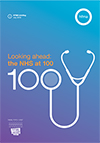Comment / A transforming role for finance
 To mark the 70th birthday of the NHS, the HFMA invited a number of commentators to look ahead to what the NHS might look like in 30 years’ time, examining both the obstacles it will face and the opportunities to enhance health and healthcare. Here, Rob Whiteman, wonders about the role of the future finance function in a transformed health service. With routine accounting automated, future accountants will spend their time interpreting wide-ranging and complex data to support strategic decision-making. But some current roles – such as speaking truth to power – will remain just as important.
To mark the 70th birthday of the NHS, the HFMA invited a number of commentators to look ahead to what the NHS might look like in 30 years’ time, examining both the obstacles it will face and the opportunities to enhance health and healthcare. Here, Rob Whiteman, wonders about the role of the future finance function in a transformed health service. With routine accounting automated, future accountants will spend their time interpreting wide-ranging and complex data to support strategic decision-making. But some current roles – such as speaking truth to power – will remain just as important.
The role of the finance leader in all sectors is transforming, but perhaps nowhere more than in the health sector.
The need for efficiency and higher productivity has already promoted a focus on business cases for projects, commercialisation and modernisation and created the opportunity for digital transformation.
Health finance in 2048 will require skills and experience in resource management, business leadership, risk control and a vision of business-wide change. Finance leaders of the future will have a principle part to play in piloting their organisations through this landscape.
Staffed with the children of millennials, comfortably skilled in coding, ‘being digital’ will be second nature in the future finance function – as it will be to all society. The focus of the accounting profession will be on a range of new techniques and practices in data science, cyber risk, virtually distributed ledgers (block chain to you) and maybe even currency-free economies.
When the NHS reaches 100, advances in digital technology will have provided an unparalleled opportunity to reimagine not just what healthcare itself is capable of delivering, but also what the finance function will look like. The exponential growth and complexity of data available will determine the nature and focus of the finance team’s work.
With much of the routine accounting and financial management automated by 2048, the future remit of the finance function will be to interpret data. It will add value through judgement and predictive analytical capabilities to support strategic decision-making and influence policy.
The capacity of finance professionals to be able to provide this kind of strategic insight will likely be supported by the introduction of new insight enabling data analytics. This will free up the finance team from the constraint of the rear-view mirror of historic accounts, allowing them to look ahead to anticipate the twists and turns of the road ahead.
To complement such changes, finance leaders will need to be purposeful in training and selecting staff to ensure they have appropriate skills. Indeed, to make the most out of new technologies and data, then as now, finance professionals will need more than just technical skills. They will also need the 'soft' interpersonal skills and emotional intelligence to influence clinicians and other delivery partners, influencing and challenging through evidence-based insights whenever necessary.
Notwithstanding known genetic advances or still more miraculous and presently unimagined discoveries, the demographics of an ageing population and soaring costs of novel therapies and technologies will only serve to increase costs pressures in the 100-year-old NHS. So, holding an ethical line will require finance professionals to exhibit strong moral courage. And, in an atmosphere where funding is always going to be a challenge, the courage to speak truth to power will be as essential as it is today.
By 2048, the divergences in organisational structures between the four nations of the UK will be greater. Since the war, public services in England have been more centralised and it’s impossible to gauge whether regional differences will occur in England as policy makers seek to promote system and place. However, accountants will almost certainly need new techniques to appraise the return on investment that preventative action, housing, education, social care, and justice can have on the health outcomes of local communities.
A place-based agenda may ultimately see a single finance function bridging the divide between these agencies, acting as the custodian of allocative and not simply technical efficiency. Its role could be to ensure the public pound is spent in the right place, at the right time, in the right way.
Alongside this, finance will need to lead from the front to overcome public mistrust of institutions adopting new forms of engagement and co-design.

Looking ahead: the NHS at 100. To mark the 70th birthday of the NHS on 5 July 2018, the HFMA has carried out some long-term thinking about the factors that will impact on the financial future of health and social care over the next 30 years, taking it through to its 100th birthday in 2048.
NHS@100 blogs
Sanjay Agrawal on changing the balance of responsibility
Anita Charlesworth on workforce key to meeting demographic challengeRelated content
The Institute’s annual costing conference provides the NHS with the latest developments and guidance in NHS costing.
The value masterclass shares examples of organisations and systems that have pursued a value-driven approach and the results they have achieved.